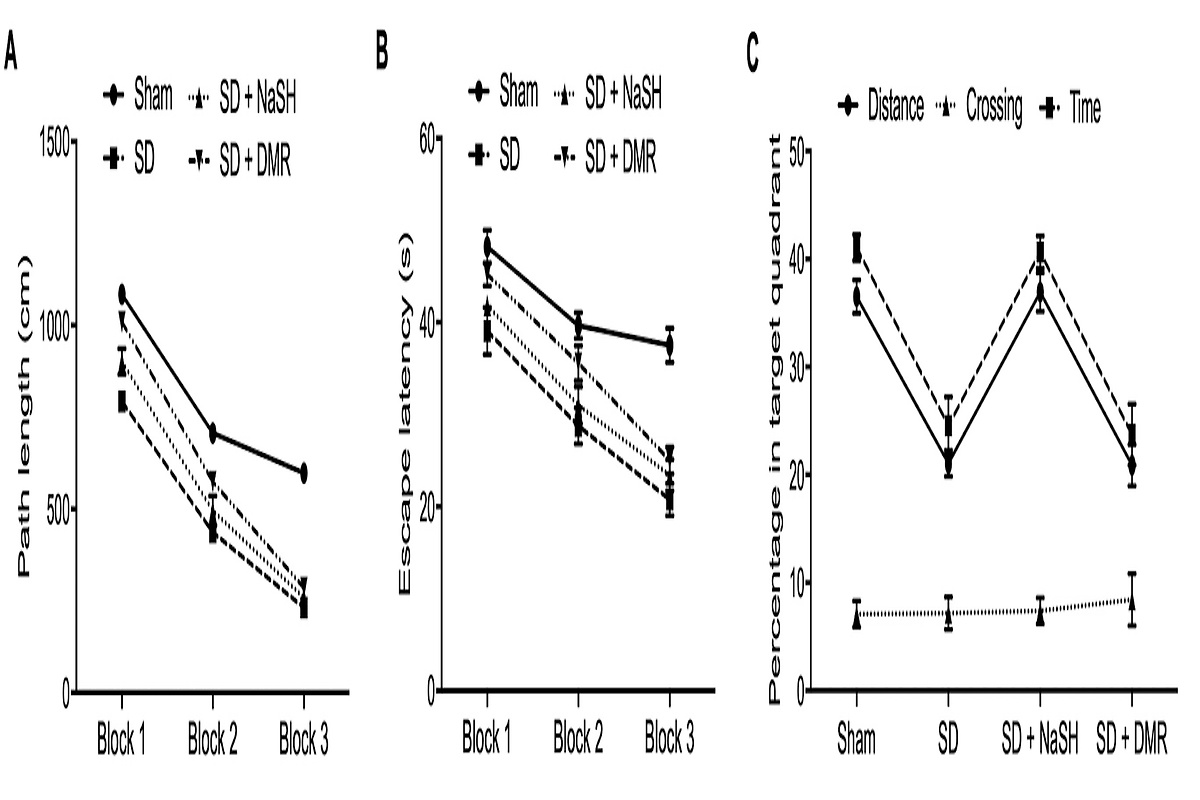Current issue
Archive
Manuscripts accepted
About the Journal
Editorial office
Editorial board
Section Editors
Abstracting and indexing
Subscription
Contact
Ethical standards and procedures
Most read articles
Instructions for authors
Article Processing Charge (APC)
Regulations of paying article processing charge (APC)
NEUROLOGY / RESEARCH PAPER
Dietary methionine restriction attenuates cognitive dysfunction associated with sleep deprivation by promoting production of hydrogen sulfide, upregulating expression of BDNF and suppressing neuro-inflammation in rats
1
Department of Neurology, The Affiliated Nanhua Hospital, Hengyang, Hunan, 411010, China, China
2
Hengyang Medical School, University of South China, Hengyang, Hunan, 421001, China, China
Submission date: 2022-08-25
Final revision date: 2023-01-12
Acceptance date: 2023-01-29
Online publication date: 2023-02-18
Corresponding author
Li Jiang
Department of Neurology, The Affiliated Nanhua Hospital, Hengyang, Hunan, 411010, China, Hengyang, China
Department of Neurology, The Affiliated Nanhua Hospital, Hengyang, Hunan, 411010, China, Hengyang, China
KEYWORDS
TOPICS
ABSTRACT
Introduction:
In this study, we aimed to study the potential role of H2S and the application of dietary methionine restriction (DMR) in the treatment of cognitive dysfunction in sleep deprived rat models.
Material and methods:
The rat groups were established as a Control group, a sleep deprivation (SD) group, a SD + NaSH group and a SD + DMR group. Behavioral data was studied via Morris water maze test. TUNEL assay, real-time PCR, immunohistochemistry (IHC) and enzyme-linked immunosorbent assay (ELISA) were performed to study the differences of cognitive impairment related genes and proteins in different rat groups.
Results:
Path length and escape latency were higher in the sleep deprived rats compared with the control rats, which were subsequently recovered by the treatment of NaSH or DMR. Also, DMR most significantly recovered the cognitive impairment and neuron status of sleep deprived rats compared with the administration of NaSH. The elevated level of hippocampal Iba1 and H2S production was recovered by NaSH and DMR, and the expressions of hippocampal phenotypic-related genes including NOS, CD68, CD32 and CD206 mRNA also showed similar trend as hippocampal Iba1. Meanwhile, the increased relative expression of IL-6 and IL-4 were recovered by DMR in sleep deprived rats, while the reduced level of hippocampal brain-derived neurotrophic factor (BDNF) and cystathionine γ-lyase (CSE) were elevated by the treatment of NaSH and MDR, with MDR exhibiting the most significant effect.
Conclusions:
The application of DMR could attenuate cognitive dysfunction in sleep deprivation rats by upregulating the production of H2S and BDNF expression and alleviating neuro-inflammation responses.
In this study, we aimed to study the potential role of H2S and the application of dietary methionine restriction (DMR) in the treatment of cognitive dysfunction in sleep deprived rat models.
Material and methods:
The rat groups were established as a Control group, a sleep deprivation (SD) group, a SD + NaSH group and a SD + DMR group. Behavioral data was studied via Morris water maze test. TUNEL assay, real-time PCR, immunohistochemistry (IHC) and enzyme-linked immunosorbent assay (ELISA) were performed to study the differences of cognitive impairment related genes and proteins in different rat groups.
Results:
Path length and escape latency were higher in the sleep deprived rats compared with the control rats, which were subsequently recovered by the treatment of NaSH or DMR. Also, DMR most significantly recovered the cognitive impairment and neuron status of sleep deprived rats compared with the administration of NaSH. The elevated level of hippocampal Iba1 and H2S production was recovered by NaSH and DMR, and the expressions of hippocampal phenotypic-related genes including NOS, CD68, CD32 and CD206 mRNA also showed similar trend as hippocampal Iba1. Meanwhile, the increased relative expression of IL-6 and IL-4 were recovered by DMR in sleep deprived rats, while the reduced level of hippocampal brain-derived neurotrophic factor (BDNF) and cystathionine γ-lyase (CSE) were elevated by the treatment of NaSH and MDR, with MDR exhibiting the most significant effect.
Conclusions:
The application of DMR could attenuate cognitive dysfunction in sleep deprivation rats by upregulating the production of H2S and BDNF expression and alleviating neuro-inflammation responses.
Share
RELATED ARTICLE
We process personal data collected when visiting the website. The function of obtaining information about users and their behavior is carried out by voluntarily entered information in forms and saving cookies in end devices. Data, including cookies, are used to provide services, improve the user experience and to analyze the traffic in accordance with the Privacy policy. Data are also collected and processed by Google Analytics tool (more).
You can change cookies settings in your browser. Restricted use of cookies in the browser configuration may affect some functionalities of the website.
You can change cookies settings in your browser. Restricted use of cookies in the browser configuration may affect some functionalities of the website.



